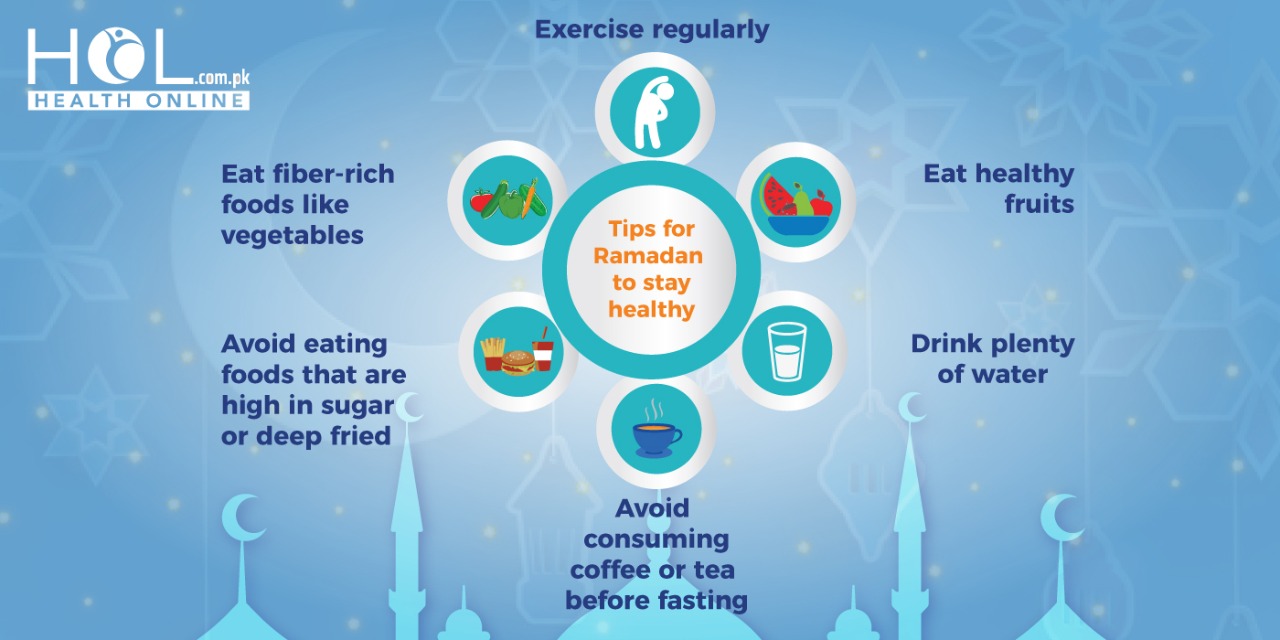RAMADAN AND DIABETES
Ramadan is a lunar-based month, and its duration varies between 29 and 30 days. It is one of the five pillars of Islam and holds special importance due to revelation of Quran Pak to Prophet (PBUH) during this month. Muslims who fast during Ramadan must abstain from eating, drinking, use of oral medications, and smoking from predawn to after sunset; however, there are no restrictions on food or fluid intake between sunset and dawn.
As per the Holy Quran, there are groups of people who are exempted from fasting including group of people with severe illness or life-threatening conditions. Sometimes diabetic patients also fall in this group due to poor glycemic control. Fasting is not meant to create excessive hardship on the Muslim individual according to religious tenets. Nevertheless, many patients with diabetes insist on fasting during Ramadan, thereby creating a medical challenge for themselves and their health care providers. Based on medical and religious advice, it is recommended to visit your doctor 6-8 weeks before Ramadan to understand your risk category before deciding to fast. If your doctor advises not to fast, you may fast later and will get the same Thawab (reward).
While preparing for your Ramadan, your visit to your doctor must conclude:
- Chart to monitor your sugar levels regularly during Ramadan
- Do’s and don’ts according to disease condition in Ramadan
- Risks of fasting
- Medication adjustment according to Ramadan
- Dietary adjustment
- Physical exertion/ Exercise plan
- Conditions under which fast should be discontinued.
RISKS OF FASTING
Diabetic patients who fast may have to face certain complications like:
- Hypoglycemia- Low blood sugar
- Hyperglycemia- High blood sugar
- Dehydration
- Diabetic ketoacidosis-Complication of Type-I diabetes
QUICK TIPS FOR HEALTHY RAMADAN WITH DIABETES
- Blood Glucose Monitoring does not break the fast. Changes in eating habits during Ramadan may affect your BSL.
People with high-risk even if not fasting should monitor their BSL 3-4 times a day.
People with moderate or low risk should monitor BSL 1-2 times everyday to observe any changes in levels.
- Adjust your medication according to the changes in BSL.
- Break the fast if :
- BSL is lower than 70 mg/dl (3.9 m mol/L). Re-check within one hour, if it does not reach the range 70-90 mg/dl (50- 3.9 m mol/L)
- Blood glucose is higher than 300 mg/dl (16.6 m mol/L)*
- Symptoms of hypoglycemia, hyperglycemia, dehydration or acute illness occur.
- When you break the fast, have only small quantities food, and avoid only eating sweet or fatty foods
- Nutritional value of meals must be considered strictly. Most health problems are likely to arise from inappropriate diet or as a consequence of over-eating and insufficient sleep.. The nutritional advice in diabetic patients should be tailored to their special needs and medical problems. It should aim at maintaining a constant body mass.
- At Suhoor eat starchy carbohydrates which release energy slowly, such as multigrain bread, oat-based cereals, basmati rice together with beans, pulses, lentils and fruit and vegetables especially dates. As with all meals, eat sensibly, don’t over eat and remember to drink plenty of water.
Try to eat just before the break of dawn, when you commence the next day’s fast
- Eating too much fried food and food high in fat and sugar in Iftar will make you put on weight and raise your blood sugar levels and make them more difficult to control. Try to eat moderate portion sizes. Remember that Ramadan is also about self-control and discipline. If you have diabetes you can ask to see a dietitian who’ll be able to give you more advice about healthy eating.
- Fasting can put you at risk of dehydration with long hours of fasting and also if you have high blood glucose levels. Drink plenty of sugar-free and non-caffeinated fluids, particularly water at Suhoor and after Iftar.
- Taraweeh is one way of light to moderate exercise during Ramadan. Rigorous exercise is not recommended during fasting because of the increased risk of low blood glucose and/or dehydration.
Take a bottle of water and glucose treatment with you to Taraweeh to avoid dehydration and hypoglycemia.
- After Ramadan avoid over-eating on Eid-ul-Fitr. It may lead to Hyperglycemia. Get your HbA1C test done and visit your health-care professional for adjustment of your medication to normal.


